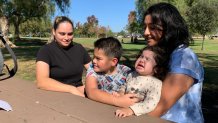Imagine that your 18-month-old baby was diagnosed with COVID-19 and at the same time is diagnosed with a rare autoimmune disorder. That’s the story of Cattaleya, a unique case in that is being studied by the Centers for Disease Control and Prevention (CDC) to prevent more cases like this and save lives.
Daisy Zúñiga’s daughter nearly died of coronavirus.
Cattaleya Is Hospitalized After Contracting COVID-19
“In one of those moments, her heart could’ve stopped and she can no longer breath on her own,” Zúñiga recalls of her baby Cattaleya’s struggle to keep her heart beating.
Her mother’s heart was shattered with every second her baby spent in the hospital bed.
“I could not imagine my life without my daughter, so young, I never imagined that something like this would happen to my daughter,” Zúñiga said.
Coronavirus entered the Zúñiga’s home, infecting 8-year-old Jaxon, Daisy and Cattaleya, who is only a year and a half old and ended up in the hospital.
“Babies with COVID had arrived, but they had a cough, fever, normal COVID symptoms, she didn’t have any normal COVID symptoms,” Zúñiga said.
The symptoms further confused the doctors.
Cattaleya couldn’t use her hands, and her legs were paralyzed when she arrived at Rady Children’s Hospital in San Diego.
The days passed, and her mothers watched as their little girl’s life got out of hand.
You never think that’s going to happen to your children. You say, ‘She’s going to grow up and get married and have a family, but I didn’t know if my daughter was going to leave the hospital alive
Daisy Zúñiga
Doctors Seek Answers to Cattaleya’s Symptoms
“They thought it was meningitis, polio, a huge list that scared me because with those diseases, it was possible that she would not be able to walk or she may go blind,” Zúñiga said.
The doctors gave little Leya, as her family affectionately calls her, three days to live.
“You never think that's going to happen to your children, You say, ‘She's going to grow up and get married and have a family, but I didn’t know if my daughter was going to leave the hospital alive,” Zúñiga said.
Neither X-rays, blood tests nor endless examinations gave insight to doctors about what was killing Leya. The problem was that she was the first case in the country.
That's why they talked to the CDC, and with the doctors, they started to see how they could help her daughter.
Doctors Diagnose Cattaleya with Guillain-Barré Syndrome
According to doctors, they diagnosed Leya with Guillain-Barré Syndrome, which is extremely rare in minors. Guillain-Barré is an autoimmune disorder in which a person’s own immune system damages the nerves, causing muscle weakness and, sometimes, paralysis.
“They had never seen a case of COVID with Guillain-Barré together in all of the United States,” Zúñiga said.
Unable to breathe or eat on her own, with a ventilator, tracheostomy and a plasma transfusion, it took Cattaleya 47 days to come back to life.
“I spoke to her, and I said, ‘Cattaleya, I'm Mommy.’ She heard me, she moved her head a little bit and tears came out when she heard us,” Zúñiga said.
Leya had won the battle. She never gave up, every day she was fighting for her life.
A warrior is how her mothers describe her, since, almost three months after facing death, Cattaleya still suffers the aftermath.
“They told us they didn't know if she would be able to walk again or move her hands or legs,” Zúñiga said.

Long Road to Recovery
And although she has recovered, Cattaleya still can’t talk, hold her weight or walk. Her recovery might take years or she may never be fully functioning again.
“It makes me sad, because for the rest of my life, I’m going to be worried that this could happen to her again. We were lucky that she survived, but I don’t know if we will be lucky the rest of our lives,” Zúñiga said.
It’s a miracle that she survived, according to the doctors who treated her. Her mothers hope her story will help motivate hesitant parents to vaccinate their children against the coronavirus.

